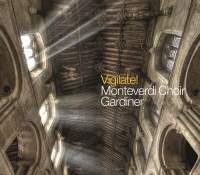Texte paru dans: / Appeared in:
*

International Record Review - (11//2014)
Pour
s'abonner / Subscription information
Soli Deo Gratia
SDG720

Code-barres / Barcode : 0843183072026
There is a strong argument to suggest that it is only in times of crisis, wether personal, religious or political, that truly great works of art are conceived. As we recall the centenary of the First World War, we are reminded yet again of the sudden upsurge in literary and musical genius which seemed to go hand in hand with the slaughter in the trenches, and as we approach the centenary of the Bolshevik Revolution, we cannot but wonder whether Russian composers would have produced such memorable works had their homeland enjoyed an uninterruptedly peaceful and comfortable existence. John Eliot Gardiner adds weight to this argument by drawing a connection between the 13 truly great pieces recorded here; that connection being that these are the responses of English composers 'obliged to operate just within (and sometimes without) the confines of the new Anglican church'. As the disc's subtitle puts it, this is English polyphony in dangerous times.
It might be deduced, however, from the wonderfully vigorous and energetic singing of the Monteverdi Choir in the opening track ‑Peter Philips's Ecce vicit Leo ‑ that on this piece, at least, those dangerous political and religious times had no real bearing. This is life‑affirming stuff and a splendid vehicle for the undiminished virtuosity of a choir celebrating its half‑century. With Robert White's Christe qui lux es et dies we do feel the burden of the times pressing down on the music with an underlying sense of profound unease which is beautifully conveyed in this carefully measured performance.
It is with the music of the next three composers ‑ Tallis, Byrd and Morley ‑ that the real heart of the matter rests. Kerry McCarthy's outstanding booklet notes point to the obvious effect Tallis's ealy career in Dover would have had on his artistic outlook, geographically placing him in the'perfect location to experience at first band influences (both musical and political) from continental Europe. As the foundations of the English Church were systematically destroyed by Henry VIII, Tallis moved through a succession of short‑lived posts in establishments, which, even while he was there, crumbled before Henry's forces. Tallis was at Waltham Abbey, which in 1540 became the last monastic establishment to fall to the crown, and the following year turned up as one of the very first Anglican lay clerks at the newly re‑established English See of Canterbury. In effect, his career spanned the greatest religious upheavals which England has ever known, and the two motets which represent his output on this disc reflect some of the
fundamental changes to English church music which took place during that
time. Suscipe quaeso Domine has all the flowery opulence of the brief
return to Rome which took place during the reign of Mary, while 0 nata
lux looks to the plainer, more direct style favoured during the
Reformation.
The Monteverdi Choir is large ‑ 27 voices are listed ‑ and it makes a
large sound. In Morley's pathos‑laden Nolo mortem peccatoris
it might seem a little too large to re‑create the essential intimacy of the
music, although it cannot be denied that Gardiner marshals his forces with
discretion and much sensitivity, never allowing sonic spectacle to eclipse
polyphonic detail. That approach results in a compelling performance of the
Byrd motet Vigilate!, which lends its title to the disc, the choir
producing a subdued, almost whispering quality of tone which supports the
comment Gardiner makes in his preface that this is a title which 'epitomises
the clandestine character of recusant music‑making in Elizabethan England'.
At the other end of the scale Robert White's deeply moving and expansive
Lamentations positively glows with this richly textured choral sound.
Nowbere is the breadth of the choral sound put to more effective use than in what is, chronologically, the latest music on the disc, Almighty God, the fountain of all wisdom. During his 60 years as organist of Worcester Cathedral, Thomas Tomkins witnessed the end of the reign of the Tudors, the rise of the House of Stuart and the fiery start of the Commonwealth when parliamentary forces overran the city during the Civil War. As a result this anthem represents one of the last great flowerings of a musical age, which, it could be argued, coincided with an age of greater national crisis than England has seen since,
With a beautifully produced
and informative booklet and a sumptuous recorded sound made in St Giles,
Cripplegate, London, this is a glorious testament not just to a golden age
in English music but to an English choir celebrating its own golden jubilee.
Fermer la fenêtre/Close window
Cliquez l'un ou l'autre
bouton pour découvrir bien d'autres critiques de CD
Click either button for many other reviews


